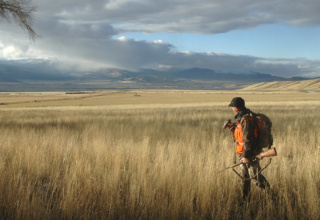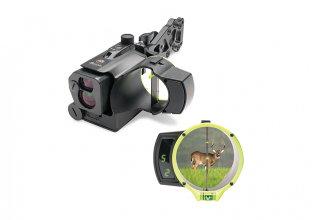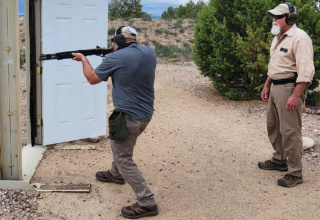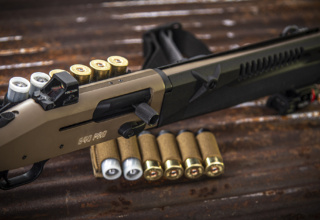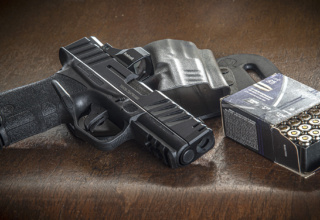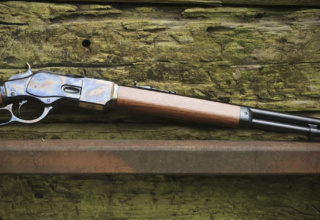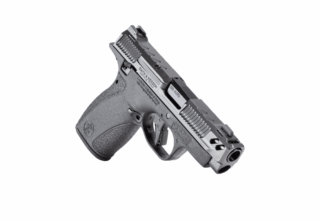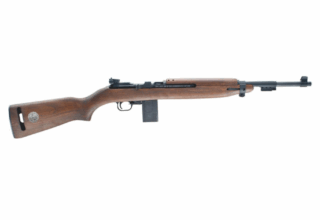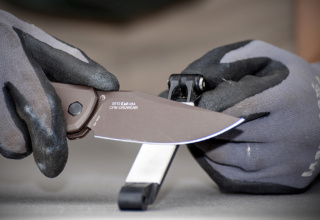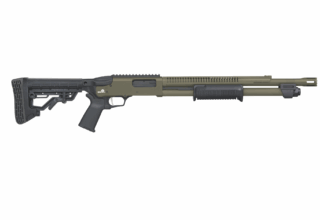While most manufactures rely on off-the-shelf MILSPEC-style components to build hunting-caliber AR rifles, Brenton USA designs their firearms purely with the hunter’s needs in mind.
by Rob Reaser
I had just settled down among some stubby pines to cover a draw above the Missouri River when I got the message:
“Hey…how soon can you get over here?”
“Where’s ‘here?'” I asked.
This was my first time hunting this area of South Dakota. Not only did I not have my bearings straight in this broken mix of prairie and deep-cut draws leading down to the glistening Missouri, I had no idea which way my hunting partner had gone after I left the truck.
“About a mile away,” he replied. “Just head straight for the sun. I’ve got two shooters chasing some does.”
One of the cool things about hunting certain areas of South Dakota is that you never know what you’ll find when it comes to deer. Whitetails and mulies often live side by side in this deceptive country, and that’s the case on the area we hunted.
To spice things up, our group split the odds by applying for different species tags. I went for a whitetail tag while my buddy Ken opted for a mule deer. The plan was to let the other know when encountering a shooter-size deer for the tag they held. On this evening, I drew the long straw.
“I’ll be right there,” I told Ken.
A lot of sweat and one lost glove later, I met up with Ken.
“They’re gone,” he said.

One of the peculiar things about hunting semi-open lands like this is how quickly animals can appear and disappear. One minute you may be looking at empty prairie and the next sweep of the binos could reveal a herd of deer that stepped seemingly out of nowhere.
With about an hour left of shooting light, Ken figured our best bet was to stay high along the plateau’s edge and ease our way around the rim flanking the Missouri. My Brenton Ranger Carbon Hunter in 6.5 Grendel and Eotech Vudu 2.5-10X were zeroed for 200 yards, so the 200- to 400-yard shot distances we would likely encounter along the jagged draws made the spot-and-stalk approach a comfortable call.

It took about ten minutes of slipping our way up-river before Ken spotted bone contrasting brightly in the setting November sun.
“There he is,” Ken whispered.
I threw up my binos and scanned the draw. Ken has only one good eye, but that peeper can pick up critters better than the two most of us carry in our noggins. Eventually, I found the buck, his head poking up just above the tawny grass covering a gentle knoll. He wasn’t a monster but compared to the hard-hunted whitetails in my eastern home range, he was a specimen to admire and a worthy opponent.
And did he ever turn out to be an opponent.
For the next half hour to 45 minutes, Ken and I slipped and slid and crouch-walked as fast as we could while maintaining some semblance of stealth. The buck was trailing a couple of does who were bent on heading somewhere else. Every time we managed a peak over the terrain ahead of us, the buck was already slipping around the next bend.
We played this game for about a half-mile or more before turning into a wide draw filled with scrub and low pines. The buck had to be somewhere in that mess, but it was so thick that he could ease out and we would never see him.
Since the buck hadn’t yet seen us, we decided to sit tight and see if we could glass him. Ken concentrated on the brushy seep at the bottom of the draw while I scanned the slope leading up to the plateau. We were down to 15 minutes of shooting light, and this was the last play.
Focusing my binos beyond the tangled top of a tall, white aspen, I spotted the buck. He was standing broadside and looking right at us.

The tree presented a problem. There was a hole between the branches that presented a pathway to the vitals, only a sizable branch cut across the deer’s chest right where I wanted to place the shot. It would be a dicey maneuver, so I chose to shoot high on the chest, thinking the odds were on my side to impact the lungs, aortic artery, or spine—all of which would deliver terminal results. Shooting the Vortex Ranger 1500’s laser through the branches, the rangefinder calculated the distance at 180 yards—easy enough for my Brenton AR and Eotech, not so much for me without a good rest.
I was sitting on a steep slope with no support in front of me, so I quickly doffed my ALPS OutdoorZ Crossfire X pack in Veil Wideland camo and set it in front of me. The Crossfire X has robust aluminum stays along the back panel, and these provided plenty of support for the rifle and at the right height for me to get a stable rest. The only question was, could I needle the 123-grain Hornady SST 6.5 Grendel through that small hole in the treetops? The calculated guess was, “Yes.”
I flipped the oversized safety selector (Brenton calls it HuntSize™) to FIRE and settled into the shot, keenly aware of the branches threatening to send my bullet skittering off to oblivion. Aiming high, I squeezed. The Ranger Carbon Hunter so effectively sucked up the recoil that I never lost my sight picture. Through the Eotech Vudu, the flash of belly white came through proud and clearly as the buck flipped over, dropping in its tracks.
Once Ken and I crossed the draw and found the buck, the postmortem told the tale. The shot went slightly higher and a good bit farther back than I had anticipated—probably deflected by a small twig I hadn’t seen. Still, I’ll give credit to the flat-shooting Hornady SST 6.5 Grendel and the precise dial-in of the rifle and scope combo for getting the job done in the face of adversity. The shot took out the spine and artery in spectacular fashion, leaving us the task of a quick deboning and a mile and a half pack-out of fresh South Dakota venison.
The Brenton USA Ranger Carbon Hunter
If you’ve never heard of Brenton USA rifles, it’s understandable. This small-volume, boutique manufacture has been working under the radar for several years, developing premium AR-platform rifles designed specifically for hunting. That doesn’t mean grabbing components from assorted manufacturers, putting them together, applying camo, and calling it an “AR hunting rifle.” On the contrary, Brenton ARs are purpose-built with the needs of the hunter foremost in the construction.
To start, Brenton ARs are chambered only for hunting cartridges. The Ranger Carbon Hunter I used in South Dakota, for instance, is offered in .450 Bushmaster, 6.5 Grendel, .223 Remington Wylde, .224 Valkyrie, .204 Ruger, and .22 Nosler.
Beyond the chamberings, Brenton dedicates its furniture to accommodate hunting applications. The carbon handguard is light, comfortable in the hand, and smooth in profile. Its trapezoidal-like cross-section offers a solid grip that enhances retention and muzzle control when wearing gloves. Two Picatinny rails beneath the handguard provide locations for sling and bipod mounting.
Behind the receiver is a Magpul MOE fixed rifle stock. For hunting, this is a fine choice because the stock is streamlined, smooth along the cheek weld, and features a hinged rubber butt plate that accesses a compartment suitable for storing small necessities, such as a bore snake, batteries, and the like.
The grip is a Hogue model with ergonomic finger grooves and a no-slip rubber coating for which Hogue is famous. Combined with the winter trigger guard integrated into the receiver, it works great when wearing gloves for cold-weather hunting.
Speaking of gloves, we all wear them either for warmth or for concealment. That’s why Brenton builds their rifles with what they call HuntSize features. All the operational controls of a Brenton AR are oversized to allow easy manipulation while wearing gloves. These include the safety selector, charging handle, mag release, and the bolt catch release. I especially like the large takedown pin. It has an extended knob that provides an easy grip so you can pull it out and access the upper receiver even with gloved hands.
Fire control is managed by Brenton’s BT-1 single-stage trigger. This drop-in unit offers adjustability from 3.5 to 6.5 pounds, letting you tune it to your specific needs. For example, you can go light on the trigger pull if you’re hunting in warm weather and shooting barehanded, or you can increase the pull weight for better control when wearing gloves. I found the BT-1 to be smooth on the pull with a crisp break. There are enough factors that can disturb the shot when taking a field rest, so the BT-1 ensures the trigger isn’t one of them.
Dressing out the Brenton AR are one of four MarbleKote camo patterns with NyloTex 10g texturing. Stylish, yes, but the finish seems to be more quiet than standard black hard coat anodizing, which is a big plus in a hunting rifle. For the 22-inch match-grade, medium contour barrel, the finish is a durable black nitride coating.
Although most AR fans enjoy outfitting their rifles to their own custom specs—at least in terms of furniture and accessories—the beauty of the Brenton AR is that you can customize further, if you want, but it’s also not necessary. Simply add the optic of your choice and these rifles are ready to hunt.
Brenton USA Ranger Carbon Hunter Specifications (as tested)
- Chamber: 6.5 Grendel (LBC)
- Barrel Length: 22-inch barrel
- Twist Rate: 1:8
- Barrel Finish: black Nitride
- Barrel Contour: medium
- Muzzle Thread: 5/8-24
- Hand Guard: Carbon, free-float
- Safety Selector: ambidextrous
- Trigger: Brenton BT-1, 3.5 – 6.5 lbs. adjustable
- Stock: fixed rifle
- Grip: Hogue
- Magazine: stainless steel, 5-round capacity
- Camo: MarbleKote (Foliage, Harvest, Midnight, Snow)
- Accuracy: sub-MOA
For more info, visit brentonusa.com.











